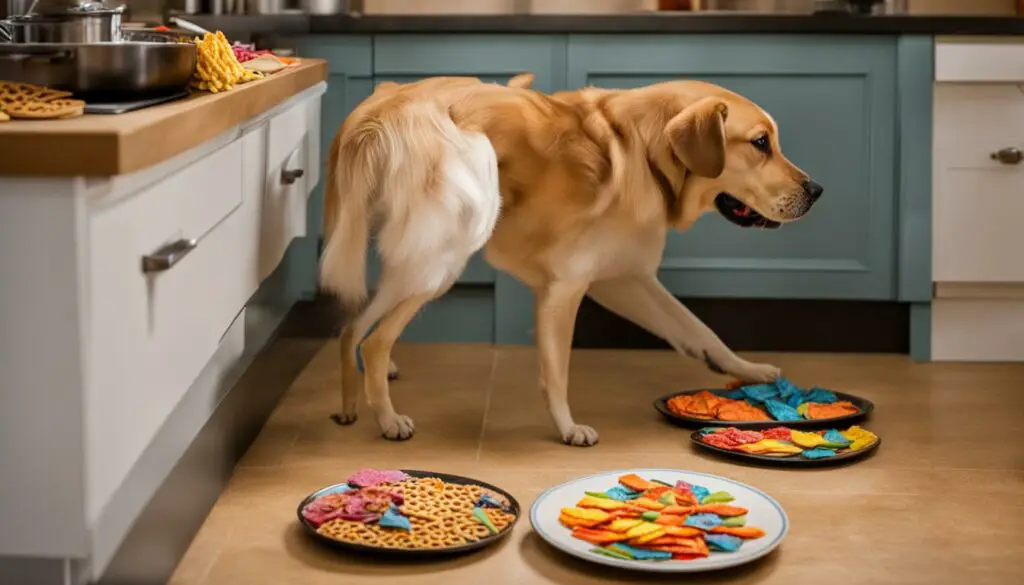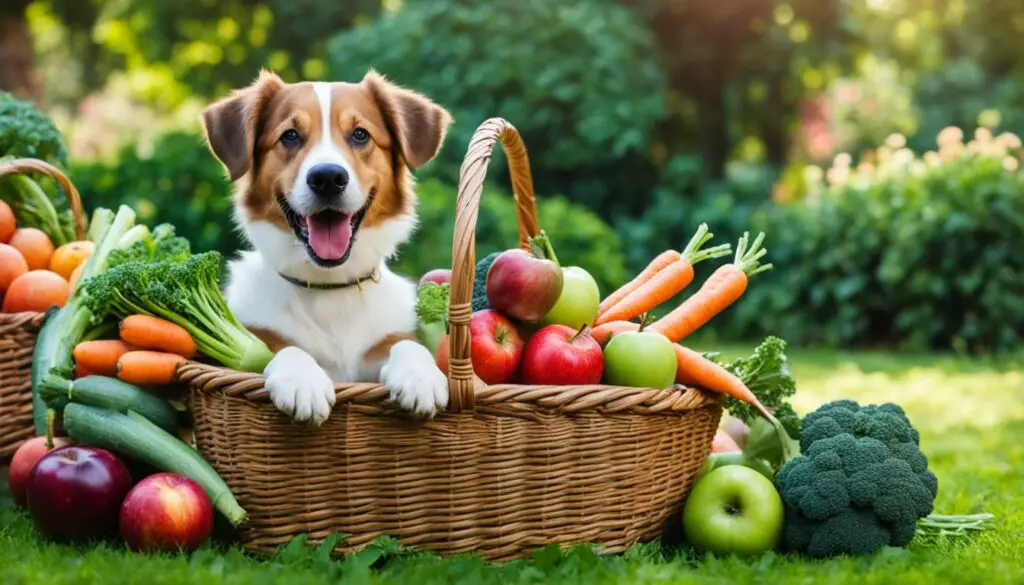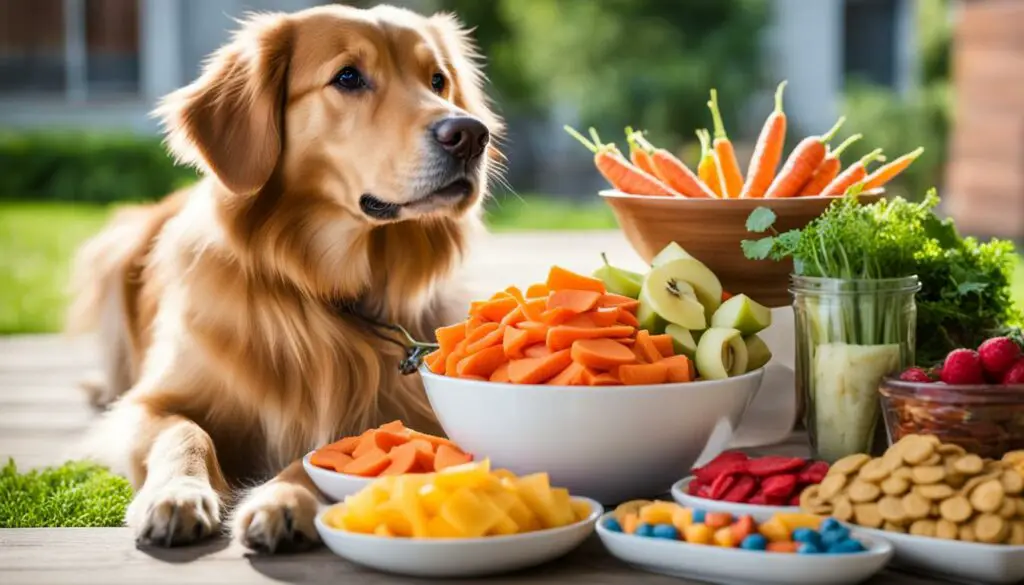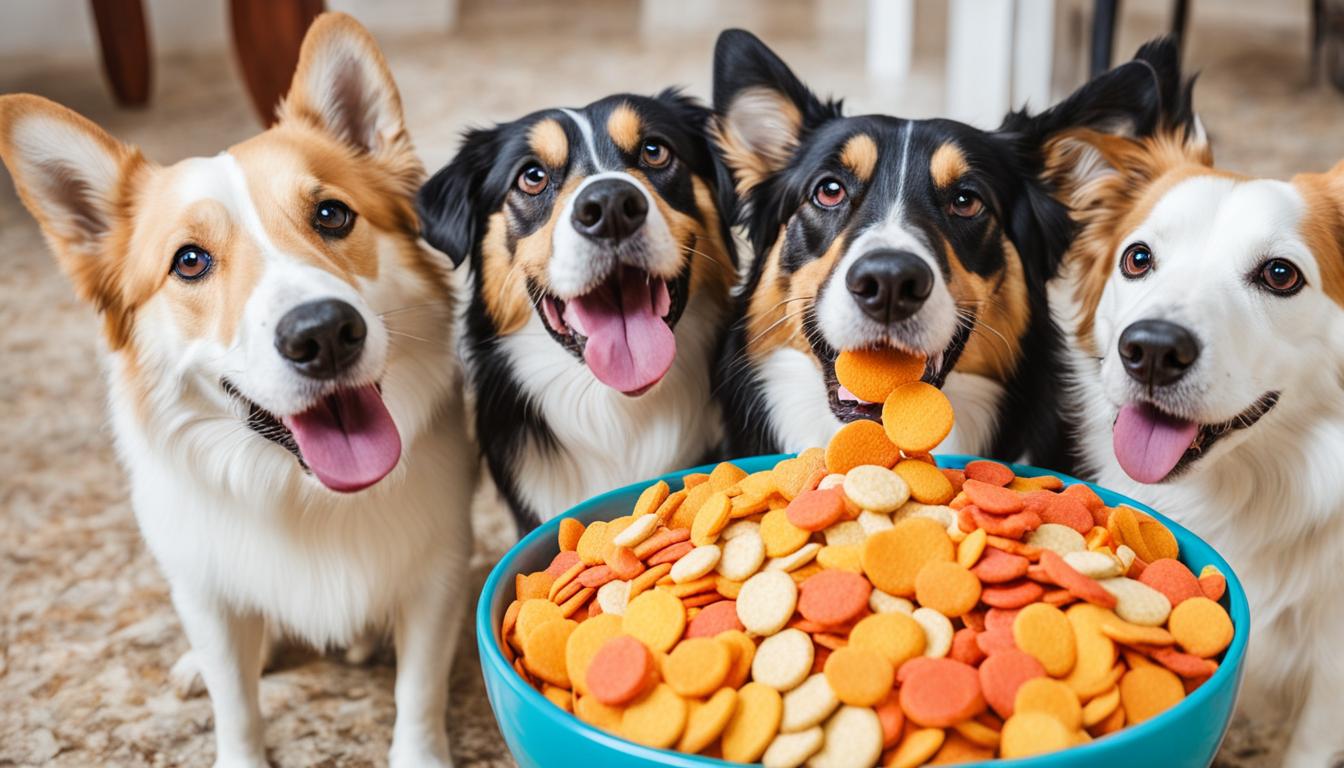Last Updated on 2 months by admin
Goldfish crackers are a popular snack enjoyed by many households, including dogs. However, it is important to understand the impact of feeding goldfish to dogs and make informed decisions about their diet. In this article, we will explore whether goldfish are bad for dogs, the potential dangers they pose, and provide safe pet snacking tips for dog owners.
Key Takeaways:
- While goldfish crackers can be consumed in moderation, they are not a recommended snack for dogs due to their high salt content and the presence of ingredients like onion powder.
- Dogs do not require the nutritional benefits found in goldfish crackers, and there are healthier alternatives available for pet snacking.
- If your dog accidentally consumes a few goldfish crackers, there is generally no need to panic. However, if your dog ingests a large amount or shows signs of illness, it is important to seek veterinary advice immediately.
- Safe alternatives to goldfish crackers include fruits, vegetables, lean meats, and dog-friendly treats that provide nutritional benefits.
- Promoting canine health through a balanced and nutritious diet is crucial to the overall well-being of your dog.
Can Dogs Eat Goldfish Crackers?

While it is not recommended to feed goldfish crackers to dogs regularly, dogs can eat goldfish crackers in moderation without immediate harm. However, it is crucial to understand that dogs do not need the nutrition found in goldfish crackers, and there are healthier options available for pet snacking.
Goldfish crackers are a popular snack enjoyed by many households, and it’s not uncommon for dogs to try and sneak a bite. These fish-shaped snacks may seem harmless, but it’s important to consider the ingredients and their potential impact on canine health.
Goldfish crackers are typically made with ingredients such as enriched wheat flour, cheddar cheese, vegetable oils, salt, and onion powder. While some of these ingredients may not pose an immediate danger to dogs in small quantities, others can be harmful when consumed in large amounts or over time.
When dogs consume goldfish crackers, the high salt content can lead to dehydration, organ failure, and other health issues. Additionally, onion powder, a common ingredient in goldfish crackers, can cause serious problems like anemia and weakness in dogs.
It’s important for dog owners to prioritize their pet’s health by providing safe and nutritious snacks. While dogs can eat goldfish crackers occasionally without immediate harm, it’s best to opt for healthier alternatives that provide necessary nutrition and minimize potential risks.
| Snack Option | Description |
|---|---|
| Fresh Fruits and Vegetables | Carrots, broccoli, and apples are all dog-friendly options that offer vitamins and minerals. |
| Lean Meats | Chicken or turkey, cooked without seasoning or additives, can be a protein-rich treat for dogs. |
| Plain Popcorn | Plain popcorn, air-popped, and without butter or salt, can be a low-calorie snack for dogs. |
| Peanut Butter | Plain, natural peanut butter can be given to dogs in moderation as a tasty treat. |
By choosing alternative snacks that are low in salt, sugar, and additives, dog owners can promote their pet’s well-being and provide them with a healthy and enjoyable snacking experience.
“While dogs can eat goldfish crackers occasionally without immediate harm, it’s best to opt for healthier alternatives that provide necessary nutrition and minimize potential risks.”
Ingredients in Goldfish Crackers

Goldfish crackers are a beloved snack enjoyed by many, both young and old. But have you ever wondered what goes into making these addictive little treats? Let’s take a closer look at the ingredients that make up the composition of goldfish crackers.
Goldfish crackers are made with a combination of key ingredients:
- Enriched wheat flour
- Cheddar cheese
- Vegetable oils
- Salt
- Onion powder
These ingredients work together to create the iconic flavor and crunch of goldfish crackers. However, it’s important to note that while some of these ingredients may be safe for dogs in small quantities, others can pose health risks if consumed in large amounts.
Let’s take a closer look at each of these ingredients:
- Enriched wheat flour: This is the main ingredient in goldfish crackers and provides the base for their crispy texture. While wheat flour is generally safe for dogs, it is important to note that some dogs may have allergies or sensitivities to gluten. If your dog has a known wheat or gluten intolerance, it’s best to avoid feeding them goldfish crackers.
- Cheddar cheese: Goldfish crackers get their distinct cheesy flavor from cheddar cheese. Cheese is generally safe for dogs and can be a tasty treat in moderation. However, it is important to note that some dogs may be lactose intolerant and experience digestive issues if they consume too much cheese.
- Vegetable oils: Vegetable oils are used in the production of goldfish crackers to provide moisture and enhance their texture. While vegetable oils are generally safe for dogs, it’s best to avoid feeding them excessive amounts as it can lead to weight gain and other health issues.
- Salt: Goldfish crackers have a salty taste that many people enjoy. However, high amounts of salt can be harmful to dogs. Consuming excessive salt can lead to dehydration, electrolyte imbalances, and even sodium ion poisoning. It’s important to avoid feeding dogs large quantities of salty snacks like goldfish crackers.
- Onion powder: Onion powder is used in goldfish crackers as a flavoring agent. However, onions and garlic are toxic to dogs and can cause serious health problems such as anemia and damage to red blood cells. It’s crucial to avoid feeding dogs any food products that contain onion powder, including goldfish crackers.
It’s important to be aware of the specific ingredients in goldfish crackers and their potential effects on dogs before deciding to share them with your furry friends. While a small, occasional nibble of goldfish crackers may not cause immediate harm, it’s best to opt for healthier and more dog-friendly snack options.
Next, we’ll delve into the health risks that goldfish crackers can pose for dogs and explore safe alternatives that you can offer as snacks. Stay tuned!
Health Risks of Goldfish Crackers for Dogs

Feeding goldfish crackers to your dog may seem harmless, but it is essential to understand the potential health risks associated with these snacks. Goldfish crackers contain high levels of salt and onion powder, both of which can be harmful to dogs.
Excessive salt consumption can lead to dehydration and can adversely affect your dog’s organs, potentially leading to organ failure or even death.
Onion powder, another common ingredient in goldfish crackers, can cause serious health problems in dogs, such as anemia and weakness. It is particularly toxic to dogs and can even be life-threatening if ingested in large amounts.
Considering these health risks, it is crucial to be cautious when giving goldfish crackers to your dog. It is best to avoid feeding them to your canine companion altogether and opt for healthier and safer alternatives.
| Health Risks of Goldfish Crackers for Dogs | Symptoms |
|---|---|
| Excessive salt consumption | – Dehydration – Organ failure – Increased thirst – Vomiting or diarrhea |
| Onion powder ingestion | – Anemia – Weakness – Pale gums or tongue – Lethargy or vomiting |
By being aware of these risks and making informed choices about your dog’s diet, you can protect their health and well-being. It’s always best to consult with your veterinarian for professional guidance regarding your dog’s specific dietary needs.
Safe Alternatives to Goldfish Crackers

Instead of feeding goldfish crackers to your dog, there are many safe and healthy alternatives available. By opting for these alternatives, you can provide your furry friend with tasty snacks that contribute to their overall well-being. Here are some suggestions:
- Fruits and Vegetables: Consider offering your dog a variety of fruits and vegetables as snacks. Carrots, broccoli, and apples are excellent choices that are rich in vitamins and fiber. Not only do they provide a satisfying crunch, but they also support your dog’s digestive health.
- Lean Meats: Another option is to offer your dog lean meats such as chicken or turkey. These protein-packed treats are not only delicious but also provide essential nutrients for your dog’s muscle development and overall health.
- Dog-Friendly Treats: There are numerous dog-friendly treats available in pet stores and online. When selecting these treats, look for options that are specifically formulated for dogs and free from harmful ingredients.
Choosing these safe alternatives ensures that your dog receives healthy snacks that are beneficial to their diet. Remember to provide treats in moderation and consult with your veterinarian for specific recommendations based on your dog’s needs.
What to Do if Your Dog Eats Goldfish Crackers

If your dog accidentally consumes a few goldfish crackers, there is generally no need to panic. However, if your dog ingests a large amount or shows signs of illness after consuming goldfish crackers, it is important to seek veterinary advice immediately. The veterinarian can assess the situation and provide appropriate guidance based on your dog’s specific condition.
In most cases, a small ingestion of goldfish crackers is unlikely to cause significant harm to your dog’s health. However, it’s essential to monitor your dog for any adverse reactions, especially if they have consumed a substantial quantity of goldfish crackers.
If your dog displays any of the following symptoms after eating goldfish crackers, it is recommended to contact your veterinarian:
- Vomiting
- Diarrhea
- Abdominal pain or discomfort
- Lethargy
- Loss of appetite
- Excessive thirst or urination
These symptoms may indicate an adverse reaction to the goldfish crackers or a potential gastrointestinal issue. It’s important not to wait for these symptoms to worsen and to seek professional advice promptly.
When visiting the veterinarian, provide them with any relevant information about your dog’s goldfish cracker consumption, including the quantity consumed and the timeframe. This information will assist the veterinarian in assessing the potential risks and determining the appropriate course of action to ensure your dog’s well-being.
Safe Pet Snacking Tips:
- Keep goldfish crackers and other human snacks out of your dog’s reach to prevent accidental ingestion.
- Read ingredient labels carefully before sharing any food with your dog to ensure it is safe and doesn’t contain harmful ingredients.
- Focus on providing your dog with a balanced and nutritious diet that meets their specific dietary needs.
- If you are unsure about a particular food’s safety for your dog, consult with your veterinarian before offering it to them.
Remember, prevention is crucial when it comes to your dog’s health. By being aware of potential dangers and making informed decisions, you can help keep your furry friend happy and healthy.
Potential Harmful Snacks for Dogs
Goldfish crackers are not the only snack that can be harmful to dogs. It’s important to be aware of other foods that can be toxic or cause adverse reactions in our furry friends. Here are some examples of potentially harmful snacks for dogs:
1. Chocolate: Chocolate contains theobromine, a substance that is toxic to dogs. Even small amounts of chocolate can cause symptoms like vomiting, diarrhea, increased heart rate, and in severe cases, seizures or even death.
2. Raisins and Grapes: Raisins and grapes can cause kidney failure in dogs. It’s best to avoid giving any foods that contain these ingredients.
3. Nuts: Some types of nuts, like macadamia nuts, can be toxic to dogs. Consumption of nuts can lead to symptoms like weakness, tremors, and an upset stomach.
4. Candy: Many types of candy, especially those that contain artificial sweeteners like xylitol, can be toxic to dogs. Xylitol can cause a sudden drop in blood sugar levels and can lead to liver failure.
By avoiding these potentially harmful snacks, you can help ensure the well-being of your furry companion. It’s important to keep harmful foods out of your dog’s reach and be mindful of what you offer them as treats or snacks.
To learn more about other dangerous human foods for dogs, refer to the table below:
| Foods | Harmful Effects |
|---|---|
| Chocolate | Contains theobromine, toxic to dogs; can cause symptoms like vomiting, diarrhea, increased heart rate, seizures, and even death. |
| Raisins and Grapes | Can cause kidney failure in dogs. |
| Nuts | Some nuts, like macadamia nuts, can be toxic to dogs; can lead to weakness, tremors, and an upset stomach. |
| Candy (with xylitol) | Some types of candy, especially those with xylitol, can be toxic to dogs; xylitol can cause a sudden drop in blood sugar levels and liver failure. |
Remember to always consult your veterinarian if your dog accidentally ingests any potentially harmful foods or if you notice any concerning symptoms. Your veterinarian will be able to provide you with the best guidance for your dog’s health and well-being.
Healthy Snacks for Dogs

When it comes to treating your dog, there are plenty of healthy and nutritious options that you can safely share with your furry friend. Choosing the right snacks ensures that your dog receives the nutritional benefits they need while enjoying delicious treats. Here are some dog-friendly options that will make their tails wag with delight:
1. Plain Popcorn
Popcorn, when plain and air-popped, can be a great low-calorie and fiber-rich snack for your dog. It’s important to avoid adding salt, butter, or any seasoning that may be harmful to your pet’s health. Pure and simple popcorn is an enjoyable treat that can keep your dog entertained and satisfied.
2. Vegetable Sticks
Vegetables like carrots and peppers are a fantastic choice for dog-friendly treats. They are low in calories and packed with vitamins and fiber, making them a healthy addition to your dog’s diet. These crunchy and colorful sticks can provide the satisfying chewing experience your dog craves while promoting good dental health.
3. Lean Strips of Cooked Meat
Lean strips of cooked meat, such as chicken or turkey, are not only delicious for dogs but also provide a good source of protein. Prioritize lean cuts without added seasoning or fatty parts, as those can be harmful to your pet. These tasty meat treats can be given as rewards during training sessions or simply as a special snack.
4. Peanut Butter (in moderation)
Peanut butter can be a tasty and protein-rich treat for dogs. When choosing peanut butter, opt for one that is free of artificial sweeteners, such as xylitol, which can be toxic to dogs. Always serve peanut butter in moderation, as it is high in fat and calories. It can be spread on dog-safe toys or used as a filling for puzzle toys to keep your dog entertained.
5. Fruits
Some fruits can be a refreshing and nutritious snack for dogs. Blueberries, strawberries, and watermelon are excellent choices as they are packed with antioxidants and vitamins. Remember to remove any seeds or pits that could be a choking hazard. Fruits should be given in moderation due to their natural sugar content.
When selecting healthy snacks for dogs, it is essential to choose options that are free from excessive salt, sugar, and additives. These harmful ingredients can negatively impact your dog’s health and overall well-being. Be mindful of portion sizes and offer snacks as part of a balanced diet.
By incorporating these healthy snacks into your dog’s diet, you can provide them with tasty treats while maintaining their health and vitality. Remember to always consult with your veterinarian before introducing new snacks or making any significant changes to your dog’s diet.
Making Informed Decisions About Dog Snacking

When it comes to snacking, dog owners have a responsibility to make informed decisions that prioritize their pet’s health. The choices we make about what our dogs consume can have a significant impact on their overall well-being. By understanding the potential risks of certain snacks, reading ingredient labels, and opting for healthier alternatives, we can ensure that our furry friends enjoy safe and nutritious snacking experiences.
One of the first steps in making informed decisions about dog snacking is to educate ourselves about the potential risks associated with certain foods. While some human snacks may seem harmless, they can be toxic or harmful to dogs. By familiarizing ourselves with these risks, we can proactively avoid sharing unsafe foods with our canine companions.
It is important to remember that not all human foods are safe for dogs. For example, chocolate, raisins, nuts, and candy can be toxic and cause serious health issues in dogs. As responsible dog owners, we must be mindful of these potential dangers and prioritize our pet’s well-being above all else.
Reading ingredient labels is another essential aspect of making informed decisions about dog snacking. By carefully examining the ingredients in the snacks we offer our dogs, we can identify potential allergens, artificial additives, and unhealthy components. Look for treats that have clear and straightforward ingredient lists, avoiding those with excessive amounts of salt, sugar, or artificial preservatives.
Check for ingredients that may be harmful to dogs:
| Ingredient | Potential Health Risks |
|---|---|
| Onion powder | Can cause anemia and weakness in dogs |
| Artificial colors | May lead to allergies and behavioral issues |
| High salt content | Can result in dehydration, organ failure, and other serious complications |
Consulting with a veterinarian is highly beneficial when it comes to making informed decisions about dog snacking. Veterinarians have the knowledge and expertise to provide valuable guidance based on your dog’s specific needs and dietary requirements. They can recommend safe and nutritious snacks that align with your dog’s overall health goals, ensuring a well-balanced diet.
Safe Pet Snacking Tips:
- Choose dog-friendly treats made with wholesome ingredients
- Opt for snacks that provide nutritional benefits
- Avoid snacks that contain harmful additives or excessive salt and sugar
- Consider homemade treats using veterinarian-approved recipes
- Monitor portion sizes to prevent overfeeding and weight gain
Making informed decisions about dog snacking ultimately boils down to prioritizing our pets’ health and well-being. By taking the time to understand the potential risks associated with certain snacks, reading ingredient labels, and seeking professional advice, we can ensure that our dogs enjoy safe and healthy snacking experiences. Let’s make conscientious choices and provide our furry friends with the love, care, and nutritious treats they deserve.
Promoting Canine Health Through Diet
A healthy diet plays a crucial role in promoting canine health. By providing your dog with nutritious snacks and treats, you can contribute to their overall well-being, helping them maintain a healthy weight, supporting their immune system, and ensuring they receive proper nutrition. Making conscious choices about your dog’s diet is a proactive way to help them live a happy and healthy life.
Benefits of a Healthy Dog Diet
- Promotes a healthy weight: Feeding your dog a balanced and nutritious diet can help prevent weight gain and obesity, which can lead to various health issues.
- Supports the immune system: A nutritious diet strengthens your dog’s immune system, making them more resilient to illnesses and infections.
- Improves digestion: A diet consisting of high-quality ingredients enhances your dog’s digestive health, reducing the risk of digestive problems.
- Increases energy levels: Providing your dog with the right nutrients can boost their energy levels, allowing them to stay active and engaged throughout the day.
Choosing Healthy Dog Snacks
When selecting snacks for your dog, opt for options that are not only delicious but also nutritious. Consider the following:
- Look for natural and wholesome ingredients: Avoid snacks that contain artificial additives, preservatives, and fillers. Instead, choose snacks that use real meats, fruits, and vegetables.
- Check for the appropriate nutrient balance: Ensure that the snack provides a proper balance of protein, carbohydrates, and fats to support your dog’s nutritional needs.
- Consider your dog’s specific dietary requirements: If your dog has any dietary restrictions or sensitivities, choose snacks that are formulated to meet those needs.
| Treat | Description |
|---|---|
| Carrot sticks | A crunchy, low-calorie snack rich in vitamins and minerals. |
| Blueberries | Nutrient-dense berries packed with antioxidants. |
| Lean chicken strips | A protein-rich treat that is easily digestible. |
| Green beans | A high-fiber vegetable that provides a satisfying crunch. |
Remember, always consult with your veterinarian before introducing new snacks or making significant changes to your dog’s diet. They can provide guidance tailored to your dog’s specific dietary needs and help ensure that their overall diet is well-balanced and suitable for their health.
“A nutritious diet is the foundation of a healthy and happy dog. By selecting wholesome snacks and treats, you can contribute to your dog’s well-being and promote a long and fulfilling life.”
Conclusion
In conclusion, it is important to consider the potential dangers of feeding goldfish crackers to dogs. While small amounts may not be immediately toxic, the high salt content and the presence of ingredients like onion powder can pose health risks to dogs. Therefore, it is advisable to avoid feeding goldfish crackers to your beloved pet.
Instead, prioritize a balanced and nutritious diet for your dog by opting for healthier alternatives. Choose dog-friendly treats that provide nutritional benefits, such as fresh fruits, vegetables, and lean meats. These options not only offer a variety of flavors but also contribute to your dog’s overall health and well-being.
By making informed decisions about pet snacking, you can promote a long and happy life for your dog. Always consult with a veterinarian for guidance on safe pet snacking choices and ensure that your dog’s diet supports their specific needs. Remember, the key to a healthy and thriving canine companion lies in providing them with the best possible nutrition.
FAQ
Are goldfish bad for dogs?
Goldfish crackers are not recommended as regular snacks for dogs due to their high salt content and the presence of ingredients like onion powder.
Can dogs eat goldfish crackers?
Dogs can eat goldfish crackers in moderation without immediate harm, but they do not need the nutrition found in goldfish crackers and there are healthier options available for pet snacking.
What are the ingredients in goldfish crackers?
Goldfish crackers are made with ingredients such as enriched wheat flour, cheddar cheese, vegetable oils, salt, and onion powder.
What are the health risks of goldfish crackers for dogs?
Goldfish crackers can pose health risks to dogs due to their high salt content and the presence of onion powder. Consuming excessive amounts of salt can lead to dehydration, organ failure, and even death in dogs. Onion powder can cause serious problems like anemia and weakness in dogs.
What are safe alternatives to goldfish crackers for dogs?
Safe alternatives to goldfish crackers for dogs include offering fruits and vegetables like carrots, broccoli, and apples as snacks, as well as lean meats such as chicken or turkey.
What should I do if my dog eats goldfish crackers?
If your dog accidentally consumes a few goldfish crackers, there is generally no need to panic. However, if your dog ingests a large amount or shows signs of illness, it is important to seek veterinary advice immediately.
What are potential harmful snacks for dogs?
Other foods like chocolate, raisins, nuts, and candy can also be toxic or cause adverse reactions in dogs.
What are healthy snacks for dogs?
Healthy snacks for dogs include plain popcorn, vegetable sticks like carrots and peppers, lean strips of cooked meat, and fruits like blueberries, strawberries, and watermelon.
How do I make informed decisions about dog snacking?
Making informed decisions about dog snacking involves understanding the potential risks of certain snacks, reading ingredient labels, and choosing healthier alternatives. Consulting with a veterinarian can also provide valuable guidance.
How does diet contribute to canine health?
A healthy diet plays a crucial role in promoting canine health, including maintaining a healthy weight, supporting the immune system, and ensuring proper nutrition.
Source Links
- https://www.hepper.com/can-dogs-eat-goldfish-crackers/
- https://www.loveyourdog.com/can-dogs-eat-goldfish-crackers/
- https://petkeen.com/can-dogs-eat-goldfish-crackers/


